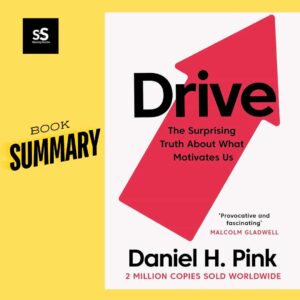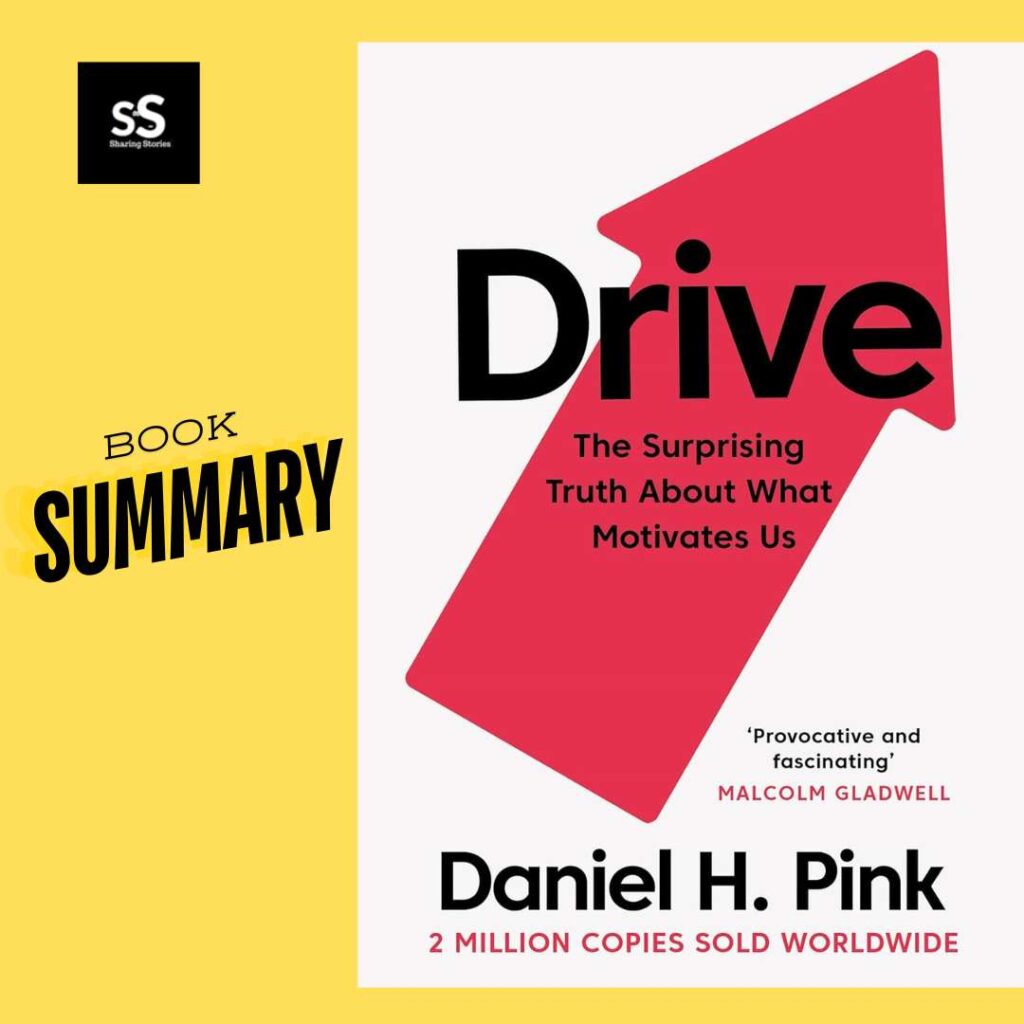Drive by daniel pink Summary
In his book Drive, Daniel Pink delves into the factors that truly motivate individuals, challenging conventional wisdom on this topic.

Brief Overview:
Daniel Pink explores the science of motivation and how it impacts various facets of life.
Understanding motivation is crucial for personal growth, productivity, and satisfaction in work and personal pursuits.
Table of Contents
Author Background
Daniel Pink is a reputable author known for his insights into behavioral science and motivation.
Who is Daniel Pink?:
An author and former speechwriter for Al Gore. Known for his expertise in human behavior and motivation.
Pink’s Expertise:
Holds a background in psychology and has authored other bestselling books like “A Whole New Mind” and “To Sell is Human.”
Previous Works:
Pink’s book Drive is an extension of his exploration of motivation from his earlier writings.
Review of Drive: The Surprising Truth About What Motivates Us
In Drive, Pink presents a fresh perspective on motivation, highlighting autonomy, mastery, and purpose as key drivers.
Main Concept:
Pink challenges traditional motivators like rewards and punishments.
Argues that autonomy, mastery, and purpose are more effective in driving lasting motivation.
Three Components of Motivation:
Autonomy: Focus on self-direction and decision-making.
Mastery: Desire to improve skills and abilities.
Purpose: Aligning work with personal values and beliefs.
Challenging Traditional Views:
Conventional methods of motivation often rely on external incentives, whereas Drive emphasizes intrinsic factors.
Autonomy in Drive
Autonomy plays a crucial role in fostering motivation, as individuals feel empowered and engaged when given freedom.
Definition:
Autonomy refers to the ability to have control over one’s actions and decisions.
Importance:
In Drive, autonomy is highlighted as a key factor in driving intrinsic motivation and creativity.
Examples:
Pink illustrates through cases how organizations that embrace autonomy witness higher employee satisfaction and innovative outcomes.
Mastery in Drive
The pursuit of mastery, or continuous improvement, is a significant motivator according to Pink’s research.
Definition:
Mastery involves the desire to enhance one’s skills and expertise continually.
Exploration:
Pink delves into how individuals driven by mastery tend to surpass goals and enjoy the process of learning and growth.
Tips for Fostering Mastery:
Pink suggests setting clear goals, seeking feedback, and challenging oneself to enhance mastery in various areas of life.
Purpose in Drive
Purpose-driven individuals find deeper satisfaction in their work, aligning their actions with their values and beliefs.
Concept of Purpose:
Purpose in Drive revolves around finding meaning and significance in one’s endeavors.
Case Studies:
Pink shares inspiring stories of individuals who have transformed their lives by aligning their work with a greater sense of purpose.
Aligning Goals:
Discovering personal and professional goals that resonate with a sense of purpose can lead to increased motivation and fulfillment.
Frequently Asked Questions (FAQs)
What is the main concept of Daniel Pink’s book Drive?
Drive explores the surprising truth about what motivates us, focusing on intrinsic motivation and the three components of autonomy, mastery, and purpose.
How does Daniel Pink define autonomy in the context of motivation?
Autonomy refers to the desire to direct our own lives, make choices, and have control over what we do. Pink emphasizes its significance in fostering motivation across various settings.
What role does mastery play in motivation according to Daniel Pink?
Mastery involves the pursuit of continuous improvement and the drive to get better at something that matters. Pink discusses how fostering mastery can lead individuals to excel in their endeavors.
How does Daniel Pink suggest individuals can align personal goals with a sense of purpose?
Pink advocates for finding intrinsic motivation through aligning personal and professional goals with a larger sense of purpose, emphasizing the importance of connecting daily actions with a meaningful cause.
Can the principles discussed in Drive be applied in the workplace and education settings?
Yes, the concepts of autonomy, mastery, and purpose explored in Drive have significant implications for increasing motivation, engagement, and fulfillment in both professional and educational environments.
What has been the critical reception of Daniel Pink’s book Drive?
Reviews from experts in psychology and business have been largely positive, praising the book’s innovative approach to motivation. However, some critics have raised questions regarding Pink’s theories and their practical application.
How can readers benefit from understanding the principles of Drive in their own lives?
By applying the lessons from Drive, readers can enhance their motivation, improve performance, and achieve greater personal fulfillment by tapping into their intrinsic drives of autonomy, mastery, and purpose.
Conclusion:
Drive by Daniel Pink offers a transformative perspective on motivation, emphasizing the importance of intrinsic drives in achieving personal and professional success. By delving into the components of autonomy, mastery, and purpose, readers can unlock their potential for growth, fulfillment, and excellence. Harnessing the principles discussed in Drive can lead individuals to new levels of motivation, productivity, and satisfaction, ultimately guiding them towards a more purpose-driven and rewarding life.
Discover marketing services, interviews & publishing tools at SharingStories.


